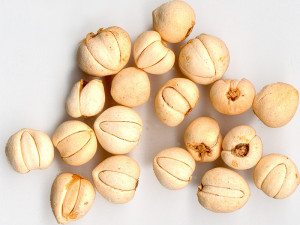Fritillaria is the processed bulb of Fritillaria cirrhosa, a flowering plant in the Liliaceae family.
Contents
Uses
Practitioners of Chinese medicine believe that fritillaria affects the heart and lung meridians, or energy pathways in the body, and use it primarily to treat various lung conditions, including asthma, bronchitis, tuberculosis, and coughs of any type. In the traditional Chinese medical system, the white color of fritillaria is thought to indicate its usefulness for ailments of the lungs, which are associated with the color white. Fritillaria’s medicinal properties are considered bitter, sweet, and mildly cold.
Fritillaria is used for many types of cough, particularly chronic cough, cough associated with difficult expectoration, and cough with blood-streaked sputum. Chinese practitioners prescribe it to moisten dry mucous membranes, resolve phlegm, and control coughing. It is thought to be most effective for coughs accompanied by reduced appetite and a stifling sensation in the chest and upper abdomen, symptoms that indicate suppressed qi, or vital energy.
Fritillaria’s secondary use is as a lymphatic decongestant to reduce swellings, nodules, fibrocystic breasts, goiter, and swollen lymph glands. In China, it also is used for thyroid and lung cancer.
Research on F. cirrhosa and its botanical relatives has generally been conducted in China and has focused on pharmacological investigation. These studies show that F. cirrhosa and other related species contain compounds that have antitussive and expectorant activity because they inhibit contraction of bronchial smooth muscle and decrease secretion of mucus. Compounds responsible for this activity, as defined in Western chemistry, include several bioactive isosteroidal alkaloids (verticine, verticinone, isoverticine, imperialine, hupehenine, ebeiedine, ebeienine, and ebeiedinone) and two nucleosides (thymidine and adenosine). The discovery of a new diterpenoid ester in fritillaria was reported in 2002.
Animal research has also demonstrated central nervous-system inhibition, including prolonged decrease in blood pressure, stimulation of the heart muscle, and dysfunction of breathing.
Benefits
1. To moisten the lungs and resolve phlegm.
2. To stop cough.
3. To clear heat and release nodules.
Caution
Side effects from fritillaria extracts used in Chinese patent medicines are rare, but this is partly because fritillaria is usually a minor ingredient in these formulae, often only 10% of the formula by weight. Even in medicines that list fritillaria as a major ingredient, it is never more than 28% of the compound. Tests of fritillaria extract in human subjects reported no side effects when the extract was taken by mouth. On the other hand, high-dosage intravenous injections of alkaloids isolated from fritillaria produced pupil dilation, tremor, slowing of the heart rate, and lowered blood pressure in human subjects.
Interactions
This herb cannot be used with Sichuan aconite root (Wutou), as they counteract each other.
Other names
Chuan Bei Mu
Reference
Source: AltMD, http://www.altmd.com/Articles/Fritillaria–Encyclopedia-of-Alternative-Medicine
Herbalshop, https://www.herbalshop.com/medicinal-herbs/sichuan-fritillary-bulb-chuan-bei-mu/

